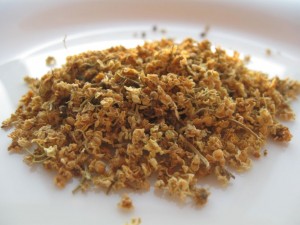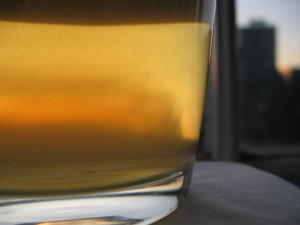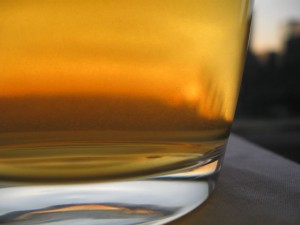Last updated: February 25, 2013
Elderflower tea is caffeine-free herbal tea made from the dried flowers of the elder or elderberry shrub. The scientific name for elderberry is Sambucus nigra which literally means “black elderberry”. Elderberries themselves are commonly cooked and made into jellies, jams and other preserves. This tea is made from the small white flowers which appear before the berries form. These flowers have been used in Europe for hundreds of years to make tea, cordials and to infuse alcoholic drinks.
Care should be taken with Sambucus nigra because the green parts of the plant (the leaves, twigs etc.) are mildly poisonous. Elderberries must be properly cooked before being eaten. Consuming large quantities of raw elderberries or leaves from the elder shrub can make you unwell. Elderflowers don’t carry the same poisonous compounds found in the rest of the plant.
Appearance
Elderflower tea is made from hundreds of tiny dried flowers. The flowers are white when they grow but after being dried have a golden brown color. The tea should be mostly free from any twigs, leaves or other plant material. The dried tea smells rich and sweet and will be immediately familiar to anyone who has tried elderflower cordial or elderberry preserve.
How to make elderflower tea
Elderflower is a robust and full-flavored herbal tea that doesn’t get bitter if it’s left to infuse for a long time. I shoot for about 15 minutes when I make a pot, but you can leave it for longer with no problems. The flavor suffers noticeably if you infuse for less than 10 minutes.
- In a cafetiere or teapot, add one heaped teaspoon of elderflowers for every cup of water. Pour the boiling water over the flowers, cover and leave to infuse
- When ready to serve, strain out the elderflowers and pour into cups or glasses to serve
- Add any other flavorings. Elderflower tea is naturally sweet so it really doesn’t need any sugar or honey. I like to garnish it with a little fresh spearmint.
Drinking elderflower tea
Color: a rich golden yellow that approaches golden brown the longer it infuses for. Elderflower tea is faintly cloudy, filled with tiny particulate matter from the flowers. The cloud twirls and swirls in the cup as you drink.
Aroma: rich, fruity, complex. Less floral than I expected, but perhaps that’s because I associate the smell of elderflower much more with cordial, wine and candy than I do with actual flowers. I spent some of my teenage years in Eastern Europe where they made an incredibly delicious naturally fermented sparkling wine from huge bunches of wild elderflowers. Did I mention that elderflower is one of my favorite herbal teas?
Taste: the first impression is freshness and light flowery notes. Then the fruitiness sneaks up from the back of my mouth and quickly takes over as the main event. The fruitiness carries no acidity and only a little sweetness, which fades to a delicious, surprising and savory saltiness. Elderflower tea carries me right through from refreshment to a dry finish.
Elderflower is one of my favorite tisanes to offer to people new to herbal tea, or people who are skeptical and think all herbal teas taste the same. It has such a unique, accessible, delicious taste that it can instantly dispel the pernicious myth that all herbal tea tastes like hot water and damp cabbage.
Elderflower tea benefits
I was a little surprised by the results of my literature search for the benefits of drinking elderflower tea. I confidently expected there would be at least some small scientific trials based on the long and widespread use of elderflowers to treat coughs and respiratory problems in herbalism and folk medicine1 . One research paper reports that elderflowers are traditionally used to treat:
Respiratory system affections, skin injuries, wounds diabetes, blood cleanser, stomachic, diuretic.
But sadly, elderflowers don’t seem to have been studied in a scientific environment for any condition at all. I couldn’t even find any animal studies. This is a real shame, because the study quoted above undertook a chemical analysis of elderflowers and found a cornucopia of phenols, polyphenols, flavanols and other good stuff. Without human studies, of course, no conclusions can be drawn.
Final Thoughts
Hopefully the lack of medical benefits won’t put people off, because elderflower tea is truly delicious tisane that can hold its own as a beverage. It’s a firm, firm favorite of mine.



